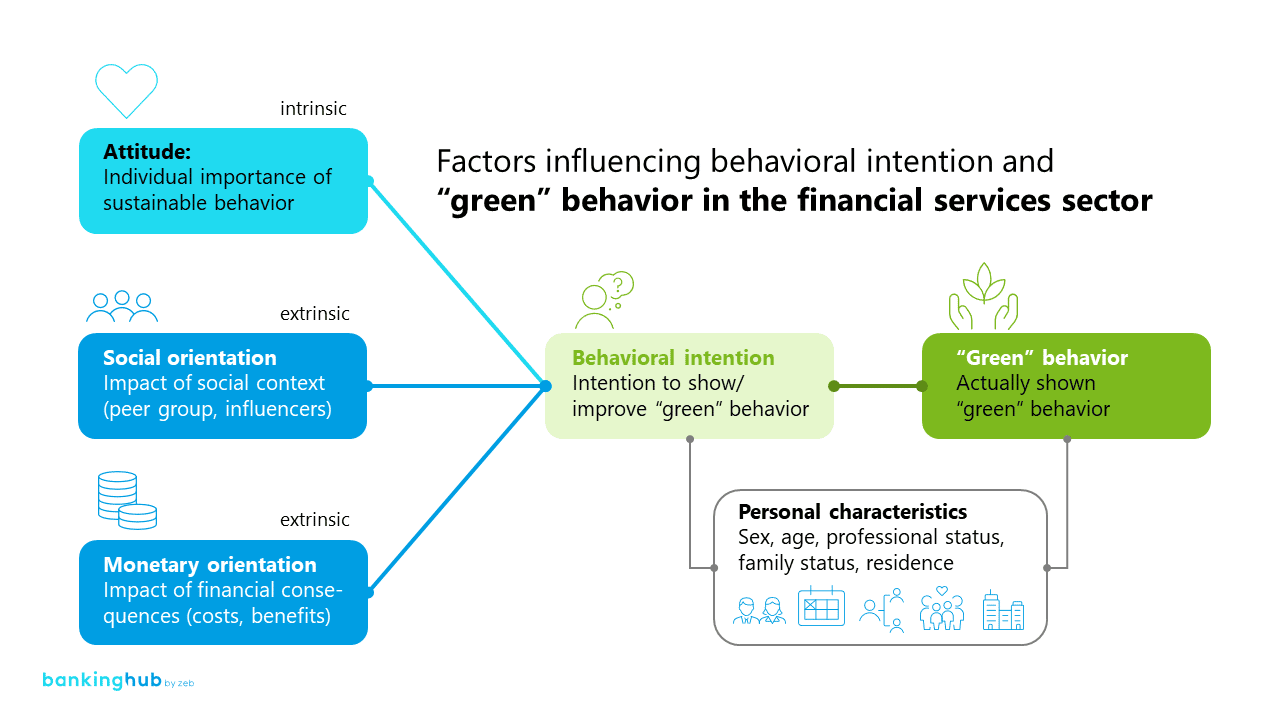The typology of green behavior is shaped by personal characteristics
Our study on behavioral intention and actual environmental behavior[1] aims to shed light on the environmental attitudes and behavioral patterns of employees in the financial sector. We investigated what motivation and motivators promote or inhibit “green” behavior among professionals in the financial services industry.
The result of this study points to an intention-behavior gap, because intention is shaped by various influences, including factors such as sex, age and marital status, which have an impact on individual choices.
The personal characteristics (such as sex, age, marital status) result in six decisive behavioral patterns:
1) Person of conviction
- Often lives in the big city and tends to be a career starter; has high expectations of their environment, especially of their employer, and is committed to more sustainability; wants to convince others; is only slightly influenced by social factors and hardly by material factors
- Pain points: Not acting sustainably, indifference
- Gain points: Convince/change others and influence environment
2) Socially oriented
- Mostly female and under 45 years of age, high demands on herself but not necessarily on her environment, actively takes up numerous suggestions, especially from the social environment; role models for women
- Pain points: Ambitions are missed, no or weak social orientation
- Gain points: Meet demands and follow role models
3) Health-conscious selectors
- Mostly women pay attention to a healthy lifestyle – regardless of age and regardless of whether they have children or not – and therefore eat sustainably, but a heavy professional and travel burden has a negative effect on sustainable behavior
- Pain points: Being under pressure, endangering health
- Gain points: Health and well-being
4) Pragmatic families
- No big intentions for change, pragmatic handling of nutrition as well as of mobility and means of transport; although a car is viewed skeptically, it is often used for travel; inhabitants of large cities also use short-haul flights
- Pain points: Additional effort, reorganization of support (e.g., baby-sitting)
- Gain points: Uncomplicated way of doing the right thing, also for children, and doing good
5) Sustainable materialist
- Mostly male; age and place of residence do not play a major role; seeks mainly monetary advantages, is less interested in cost savings; does not like to give up car use and nutritional habits, but can be influenced above all by direct social environment
- Pain points: Practices renunciation, lack of social recognition
- Gain points: Material gain, recommendations from friends
6) Indifferent hedonists
- Mainly young city dwellers who – if they can afford it – like to take long-distance trips and long-haul flights; especially men are reluctant to do without a car and good food, but are responsive to their direct social environment
- Pain points: Practice renunciation, lack of social recognition
- Gain points: Have fun, be able to afford pleasant things
[1] The study was sent to 1200 professionals working in 17 locations in 13 European countries, of whom 470 (39%) responded to the survey. Of these participants, 20% are convinced of the need to act in a “green” manner, and only 5% are barely amenable. Monetary benefits combined with social motivations contribute to sustainable living, whereas financial benefits alone actually hinder it.
Get the full story in our article at the renowned Open Access journal “Sustainability”: Green Behavior: Factors influencing behavioral intention and actual environmental behavior of employees in the financial service sector

